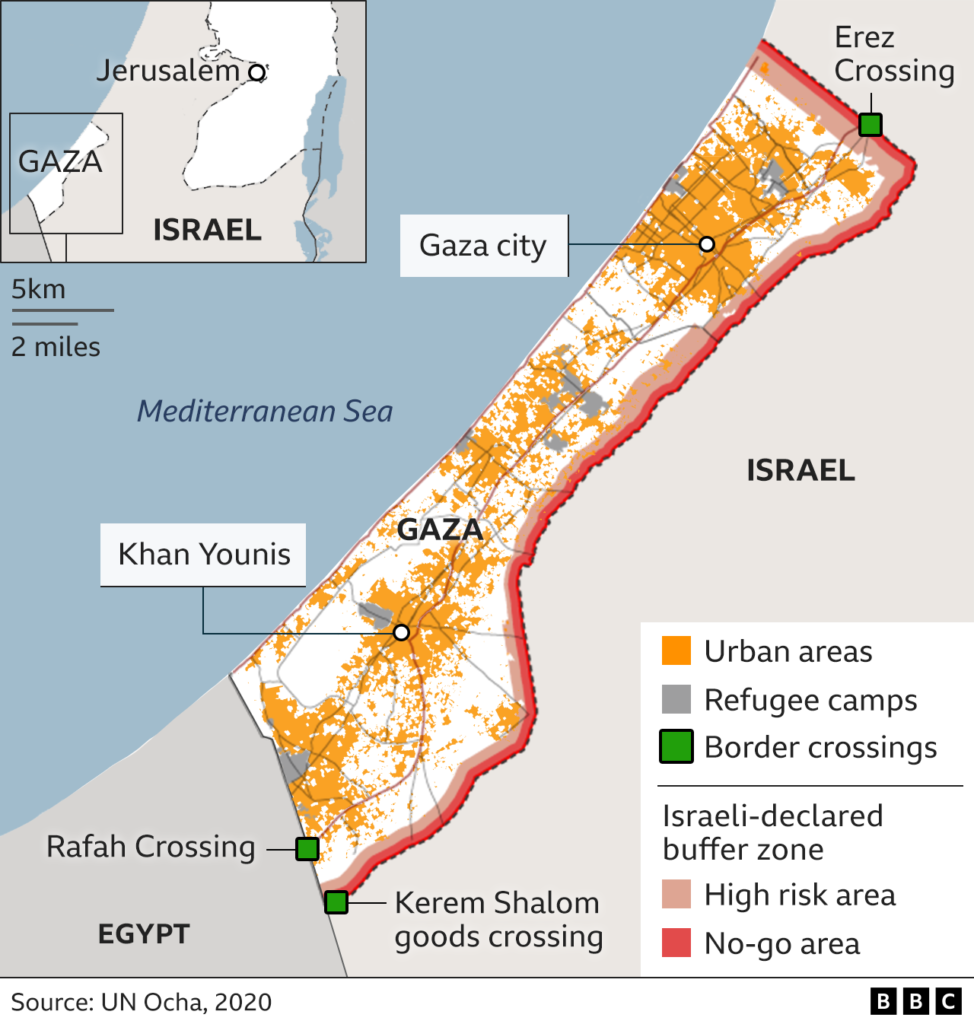
The Palestinian militant group Hamas has launched an unprecedented attack on Israel, with its fighters entering communities near the Gaza Strip, killing hundreds of residents, and taking dozens of hostages. Here’s what you need to know about the people and places involved – and the essential context to understand this story.

What is Hamas?
Hamas is a Palestinian militant group which rules the Gaza Strip. It is sworn to Israel’s destruction and wants to replace it with an Islamic state. Hamas has fought several wars with Israel since it took power in Gaza in 2007. In between those wars, it has fired or allowed other groups to fire thousands of rockets at Israel and carried out other deadly attacks. Israel has also repeatedly attacked Hamas with airstrikes, and, together with Egypt, has blockaded the Gaza Strip since 2007, for what it says is its security. Hamas as a whole, or in some cases its military wing, is designated a terrorist group by Israel, the United States, the European Union, and the UK, as well as other powers. Hamas is backed by Iran, which funds it and provides weapons and training.
What is the Gaza Strip?
The Gaza Strip is a 41km (25-mile) long and 10km-wide territory between Israel, Egypt, and the Mediterranean Sea. It is home to about 2.3 million people and has one of the highest population densities in the world. Israel controls the airspace over Gaza and its shoreline and restricts who and what goods are allowed in and out through its border crossings. Similarly, Egypt controls who passes in and out through its border with Gaza. About 80% of the population of Gaza depends on international aid, according to the UN, and about one million people rely on daily food aid.

What is Palestine and when did the conflict with Israel begin?
The West Bank and Gaza, known as the Palestinian territories, as well as East Jerusalem and Israel, all formed part of the land known as Palestine since Roman times. These were also the lands of Jewish kingdoms in the Bible and are seen by Jews as their ancient homeland. Israel was declared a state in 1948, though the land is still referred to as Palestine by those who do not recognize Israel’s right to exist. Palestinians also use the name Palestine as an umbrella term for the West Bank, Gaza, and East Jerusalem.

Why did Hamas attack now?
Although the attack by the militants on 7 October came without warning, it happened at a time of soaring Israeli-Palestinian tensions. This year has been the deadliest year on record for Palestinians in the Israeli-occupied West Bank, which could have motivated Hamas to strike Israel with a spectacular attack. Hamas might also have been seeking to score a major propaganda victory against Israel to boost its popularity among ordinary Palestinians. The fact that it has taken so many Israelis captive is likely to be aimed at pressuring Israel to free some of the about 4,500 Palestinians held in Israeli prisons – a highly emotive issue for all Palestinians. There is also speculation that the attack was orchestrated by Iran – Israel’s arch-foe – though Iran’s ambassador to the UN has denied his country’s involvement. Iran and Hamas also staunchly oppose the growing prospect of a historic peace deal between Israel and Saudi Arabia – something that might be thwarted if Israel’s military response to the attacks provokes widespread anger in the Arab world.
How unprecedented is this attack?
As our International Editor Jeremy Bowen writes, this is the most ambitious operation Hamas has ever launched from Gaza and the most serious cross-border attack Israel has faced in more than a generation. Militants breached the wire that separates Gaza from Israel in multiple places. The unprecedented attack came a day after the 50th anniversary of the surprise attack by Egypt and Syria in 1973 that started a major Middle East war. The significance of the date will not have been lost on the Hamas leadership.
Is this a major Israeli intelligence failure?
Yes, says our security correspondent Frank Gardner. With the combined efforts of Shin Bet, Israeli domestic intelligence, Mossad, its external spy agency, and all the assets of the Israel Defense Forces, he says it is frankly astounding that nobody saw this coming or failed to act on it if they did have a warning. Israel has arguably the most extensive and well-funded intelligence services in the Middle East, with informants and agents inside Palestinian militant groups, as well as in Lebanon, Syria, and elsewhere. On the ground, along the tense border fence between Gaza and Israel, there are cameras, ground-motion sensors, and regular army patrols. The barbed-wire topped fence is supposed to have been a “smart barrier” to prevent exactly the sort of infiltration that has taken place in this attack. Yet the militants of Hamas simply bulldozed their way through it, cut holes in the wire, or entered Israel from the sea and by paraglider.
What could happen next?
Hamas militant commander Mohammed Deif has called on Palestinians and other Arabs to join the militants’ operation to “sweep away the [Israeli] occupation.” A big question now is whether Palestinians in the occupied West Bank and East Jerusalem or elsewhere in the region will heed his call, says our Jerusalem correspondent Yolande Knell. Israel undoubtedly sees the potential for a war that could open up on multiple fronts. A worst-case scenario is that it could draw in the powerful Lebanese militant group, Hezbollah. On Sunday morning, Hezbollah launched a number of missiles and shells at northern Israel, without causing casualties. The Israeli military has ordered a massive reinforcement of troops. As well as its intense airstrikes on Gaza, it has indicated that it is planning a ground operation there.”
•Source: BBC











